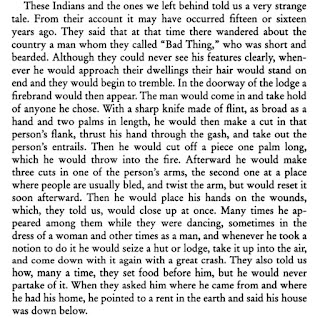Monday, May 13, 2019
"Mala Cosa" (Cabeza de Vaca)
The Spanish explorer Álvar Núñez Cabeza de Vaca recounts an incident that was related to him by Native Americans he encountered during his long sojourn across the southern US and northern Mexico:
Narrative of the Narváez Expedition, edited by Harold Augenbraum.
Cabeza de Vaca was one of a handful of survivors of a 16th-century expedition to Florida that went catastrophically wrong. The accuracy of his account of his travels on many points has been questioned, but few things in it are as difficult to believe as the one thing that is unquestionably true, which is that he and three other men did survive eight years wandering among various Native American peoples before finally meeting up with a group of his countrymen near Culiacán in Sinaloa. Along the way he found himself cast in the role of faith healer, and claimed to have performed countless miracles on ailing (and very grateful) Indians.
The passage above has been much pondered. It appears to record some kind of shamanic performance reminiscent in some ways of modern "psychic surgery" cons and fortune-telling bujo scams. How the Indians understood what they told Cabeza de Vaca, and how it differed from what he recorded, is impossible to say. It's the oddest passage in the book.
Ouch
Jeopardy clue: "John & Priscilla Alden lie in the U.S.A.'s oldest maintained cemetery, which like a poem about the couple, is named for this person." Contestants' proposed questions: "Who is Poe?," "Who is Arlington?," and "Who is Mary?"
(The correct question: "Who is Myles Standish?")
Sunday, May 12, 2019
On Ants (Thomas Bewick)
"The history and œconomy of these vary curious Insects are (I think) not well known — they appear to manage all their Affairs, with as much forethought & greater industry than Mankind — but to what degree their reasoning & instructive powers extend is yet a mystery — After they have spent a certain time toiling on earth, they then change this abode, get Wings, & soar aloft into the atmosphere — It is not well known what state they undergo, before they assume this new character, nor what becomes of them after."
(Memoirs)
On Being Alone
"As the lodges afforded so little shelter, people began to die, and five Christians quartered on the coast were driven to such extremity that they ate each other until but one remained, who, being left alone, had nobody to eat him." — Cabeza de Vaca
Adapted from the Lakeside Press edition of Narrative of the Narváez Expedition, edited by Harold Augenbraum.
Friday, May 03, 2019
An Existential Necessity (Luc Sante)
The Paris Review has inaugurated a new blog, Pinakothek. Written by Luc Sante, it's devoted to "miscellaneous visual strata of the past." Here's an excerpt from the second post, "Arcade":
Getting yourself photographed was a pastime and an existential necessity. It reminded you that you existed outside your own head. It showed you your face as others would see it. It gave you an opportunity to compose yourself, although few had the skill to do so successfully, and often the photographer’s haste and hard sell would mitigate against it. Most people come off in arcade pictures as if they had suddenly been shoved onstage to face an audience of thousands."Pinakothek" (from a Greek and Latin word for a picture gallery) was also the title of a short-lived feature that Sante maintained on his website a number of years ago.
Wednesday, May 01, 2019
Hera
Her sons are out of college and living lives of their own by the time her husband leaves. She could stay on in the house but every room has bad memories, so she winds things up and moves back to the river town where she was born. It's the same river but the people have moved on. Old acquaintances, when she happens to bump into someone she recognizes, are pleasant enough but their faces are burdened with histories she no longer shares. Downtown there are newcomers, refugees from a faraway war that has disappeared from the headlines. She rather likes the women, who are friendly, direct, and tough, but finds the men a harder read. She volunteers a bit and joins a gym, and keeps the few grey-haired men who seem to sense an opportunity at arm's length.
On overcast days she likes to walk through town and over the bridge and watch fishermen drop their lines into the dark water. Sometimes the drawbridge rises and a barge goes by, its wake slowly rippling until it breaks on the shore. She wonders what the barges carry and where they are bound, upriver empty and downriver full. Semis cross the bridge and sometimes sound their horns at her; she thinks they wouldn't bother if they could see the lines in her face.
The mail brings letters, catalogs, bills. She keeps her rooms tidy, cooks casseroles that last for days, reads into the night, rises with the dawn. Sometimes she sees great flocks high above and hears the faint cries of birds returning to Canada for the summer. She resolves to make the same trip some spring, when the moment is ripe and the last ice floes have broken up.
Subscribe to:
Comments (Atom)





